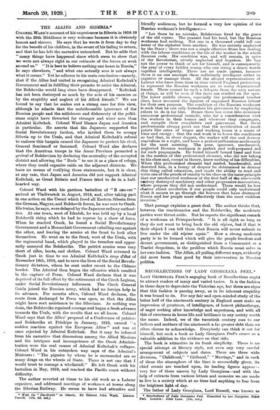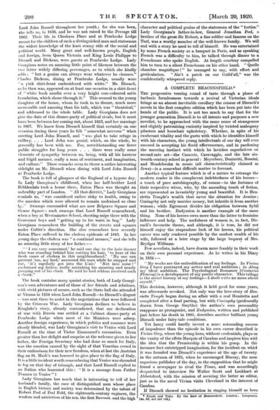RECOLLECTIONS OF LADY GEORGIANA PEEL* LADY GEOBGIANA PEEL'S engaging book
of Recollections ought to attract readers of many and varied tastes. It is the fashion in these days to depreciate the Victorian age, but there are signs that this fashion is passing away, as in its inherent stupidity it was bound to do. For any fair and open-minded study of the latter half of the nineteenth century in England must make an impression of greatness, of intelligence, of honest philanthropy, of eager seeking after knowledge and experience, and with all this of sweetness in home life and brilliance in any society worth the name. Indeed, we of the twentieth century owe to our fathers and mothers of the nineteenth a far greater debt than we often choose to acknowledge. Everybody can think it out for himself, but such a book as Lady Georgiana Peel's comes as a valuable addition to the evidence on that side.
The book is attractive in its frank simplicity. There is no special attempt at literary style, not even any very careful arrangement of subjects and dates. There are three wide divisions, " Childhood," " Girlhood," " Marriage," and in each of these the atmosphere of the time is successfully given, its chief events are touched upon, its leading figures appear— very few of these unseen by Lady Georgiana—and with the help of extracts from various letters and memoirs we are made to live in a society which at no time had anything to fear from the brightest light of day.
The father of Lady Georgians, Lord Russell, was known as
• Recollection* of Lady Ocorqiena Peel. Complied by her Daughter. Ethel Peel. London : John Lane. [16e. net.1
Lord John Russell throughout her youth ; for she was born, she tells us, in 1836, and he was not raised to the Peerage till 1862. Their life in Chesham Place and at Pembroke Lodge meant for the children of such a distinguished man and statesman the widest knowledge of the least seamy side of the social and
political world. Many great and well-known people, English and foreign, from Queen Victoria and King Louis Philippe to Disraeli and Dickens, were guests at Pembroke Lodge. Lady Georgiana notes an amusing little point of likeness between the two latter widely differing personages, as to which she kindly adds : " but a genius can always wear whatever he chooses." Charles Dickens, dining at Pembroke Lodge, usually wore
" a rink shirt-front embroidered with white." Mr. Disraeli, as he then was, appeared on at least one occasion in a shirt-front of "white book muslin over a very bright rose-coloured satin foundation, which shone through it." This seemed to the young daughter of the house, whom he took in to dinner, much more memorable and amusing than his talk, which was " theatrical," and addressed to the whole table. Lady Georgiana does not give the date of this dinner-party of political rivals, but it must have been between her coming out, about 1853, and her marriage in 1867. We know from Disraeli himself that certainly on one occasion during these years he felt " somewhat nervous " when meeting Lord John Russell, and " was glad to take refuge in raillery.. . . Lord John was genial, which, on the whole, he generally has been with me. For, notwithstanding our fierce
public struggles for long years . . . there were really some elements of sympathy between us, being, with all his hauteur and frigid manner, really a man of sentiment, and imagination, and culture." These remarks seem to throw a rather interesting
sidelight on Mr. Disraeli when dining with Lord John Russell at Pembroke Lodge.
The book is full of glimpses of the England of a bygone day. In Lady Georgiana's childhood, when her half-brother Lord Ribblesdale took a house there, Eaton Place was thought an unhealthy part of London. " All that district," Lady Georgiana reminds us, " was considered rather risky to health, owing to the marshes which were allowed to remain undrained so close by." Swamps surrounded what are now Belgrave Square and Sloane Square : such swamps that Lord Russell remembered, when a boy at Westminster School, shooting snipe there with the Grosvenor boys and "getting up to his waist in bog." Lady Georgiana remembers the building of the streets and squares under Cubitt's direction. She also remembers how severely Eaton Place suffered in the cholera epidemic of 1843. In her young days the cholera was " a continual menace," and she tells an amusing little story of her father :-
" I am very concerned,' ho said one day to the hair-dresser who was standing behind him cutting his hair, ' to hear of the fresh cases of cholera in this neighbourhood.' No one can prevent 'em, my lord,' answered the man while he snipped and cut, ' it's regularly got into the h'air.' Not into mine ! ' exclaimed my father, really mistaking his meaning and nearly jumping out of his chair. He said he had seldom received such a shock."
The book contains many quaint stories, both of Lady Georgi- ana's own adventures and of those of her friends and relations, with vivid pictures of scenes, such as the State ball she attended
at Vienna in 1854 when Lord John Russell—to Disraeli's disgust —was sent there to assist in the negotiations that were followed by the Crimean War. Lady Georgian declines to believe in Kinglake's story, already contradicted, that our declaration of war with Russia was settled at a Cabinet dinner-party at Pembroke Lodge when most of the Ministers were asleep. Another foreign experience, in which politics and romance were closely blended, was Lady Georgiana's visit to Venice with Lord Russell at the time of Victor Emmanuel's coronation. Even greater than her delight and surprise at the welcome given to her father, the Foreign Secretary who had done so much for Italy, was the emotion caused by the sight of that Venetian crowd in
their enthusiasm for their new freedom, when at last the Austrian flag on St. Mark's was lowered to give place to the flag of Italy. It is a little incident worth remembering that Venice was shrouded in fog on that day of triumph, and that Lord Russell replied to
an Italian who lamented this : " It is a message from Father Thames to Venice "
Lady Georgiana has much that is interesting to tell of her husband's family, the race of distinguished men whose place in English history and society was determined by the talent of Robert Peel of Peel Fold, the eighteenth-century engineer, the wisdom and patriotism of his son, the first Baronet. and the high
character and political genius of the statesman of the " forties." Lady Georgiana's father-in-law, General Jonathan Peel, a brother of the great Sir Robert, a fine soldier and famous on the Turf, was a worthy member of the well-known family. We will end with a story he used to tell of himself. He was entertained by some French society at a banquet in Paris, and as speaking French was a difficulty to him, he talked through dinner to a Frenchman who spoke English. At length courtesy compelled him to turn to a silent Frenchman on his other hand. " Quelle chambre magnifique ! " he managed to say, with effort and gesticulation. " Ain't a patch on our Guild'all," was the confidentially whispered reply.





































 Previous page
Previous page